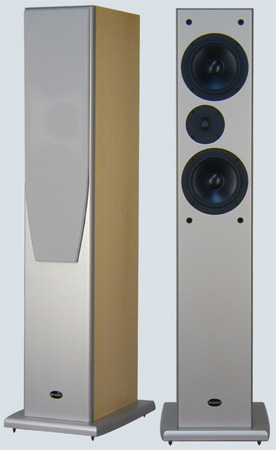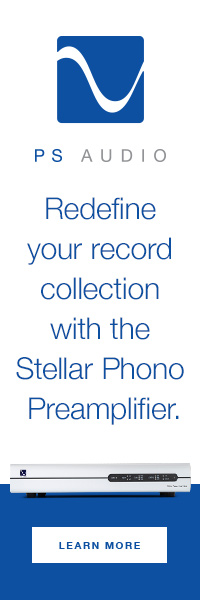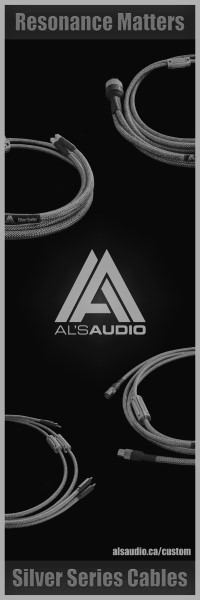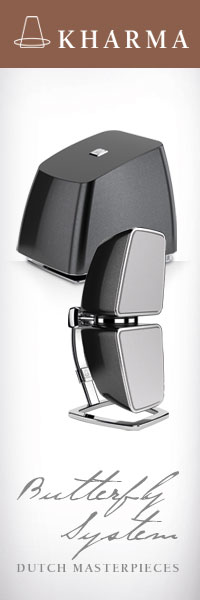Audes 535 Loudspeaker
| Audes 535 Loudspeaker |
|
|
|
Joe Lamano |
|
23 July 2003 |
 Specifications
Specifications
Design: 2-Way video shielded; (2)6½” cone woofers; 1” dome tweeter
Impedance: 4 Ohm
Frequency Range: 47-20000 Hz
LF Corner (-6 db): 40 hz
Crossover Frequency: 20khz
Sensitivity: 89 db
Dimensions: 46” × 8” × 13½“
(H × W × D)
Weight: 59 lbs.
Price: $1599
Address:
AUDES USA INC.
58 Winding Brook Drive
Matawan, NJ 07747
Telephone: (732) 921-1241
Fax: (732) 765-0052
Website: www.audes.com
Email: info@audes.com
Audes, the Estonia-based loudspeaker company, has released a new product line with the same focus—great sound at a reasonable price—but with a slightly different twist this year. With the “Maestro” product line, Audes is attempting to meet many consumer needs with a single speaker, versus focusing on accommodating pure audiophile needs. My first introduction to Audes was slightly over one year ago when I had the opportunity to review the Audes Blues loudspeaker. I was very impressed by the sound of the Blues, especially for the price. So naturally, I was very interested when I was asked to listen to the new Audes 535’s.
The 535’s are designed to suit the needs of audio and video enthusiasts that share their living space with a home theatre and/or audio system. The designers at Audes realize that these days, people have merged their audio and video systems into one living space, instead of a dedicated “listening room.” The new approach taken by Audes was interesting to me, and I became curious to hear how the 535 sounded compared to the Blues and other speakers.
The 535’s arrived in boxes similar to that of the more expensive Blues speakers; however, the boxes consisted of only double cardboard and did not use the thin wood liners on all sides. Thanks to their tall and narrow design, these speakers do not take up very much floor space, and are easier to place than side firing woofer designs like the Blues. The internal video shielding allows the 535 speakers to be placed adjacent to a television set for home theater use, without distorting the picture. To complement the loudspeakers, Audes offers a matching center channel speaker, powered subwoofer, and bookshelf speakers that can be used for the rear channels, for a complete home theater setup.
The 535’s are the largest loudspeaker in the Maestro line. Each speaker is only 8” wide, 13” deep, but stands tall at 46” with the base and spikes installed.
At first glance, the 535’s appear very similar to the Blues, especially from the front, as the tweeter is positioned between two other drivers. They are also built with the same high quality and craftsmanship. The pair I received was finished in a light cherry color; they have an elegant, tall and narrow design with a real wood veneer finish on the sides and top, and a long narrow grille that extends the entire face of the speaker. I was impressed that Audes chose to use a real wood veneer instead of the vinyl veneer often found on many other speakers in this price range. I feel the real wood veneer gives the speaker a more expensive, furniture-quality look. The entire cabinet is internally braced, and built using 19mm MDF. The front and rear of the speaker is finished with a black painted MDF layer to support the drivers and dampen the cabinet. In the rear of the speaker are two large bass ports and two pairs of gold plated 5-way binding posts for bi-wiring.
The 535’s use a 2-way configuration versus the 3-way configuration of the Blues. The 1-inch tweeter mounted between the two woofers is made by SEAS, and the low frequencies are driven from two front mounted 6-inch polypropylene woofers (introduced this year and designed and built by Audes). The internal wiring is composed of different cables provided by DH Labs, and the caps are made by F&T in Germany. Sonically, the 535’s are very crisp and clear, but not as smooth in the midrange as the more expensive Blues. The resolution and soundstage of this speaker is very good for the price range. I must admit that at first, I felt the 535’s were lacked bass and sounded bright. But after almost a 48-hour break-in period, the bass response became tighter and deeper, and the highs had softened slightly. I should also mention that I make this statement after becoming very accustomed to listening to my reference pair of
Talon Ravens, which boast extraordinary bass with a wide and detailed soundstage. With proper placement in the listening area, the 535’s are capable of being self-sufficient, although at times, I did find they struggled to produce significant low frequency volume with deep bass notes—a situation that can be remedied with a subwoofer. As I make these points, I should also note that the 535’s are Audes’ mid-level floor-standing speaker. The larger Blues and Orpheus speakers provide greater musical qualities, but at a higher price.
I connected the 535’s to my Pass Labs X150 amplifier, knowing that this amp would not provide coloration that could hide the speaker’s characteristics, and placed the speakers 1.5’ from the back wall and 11’ apart, I found that this configuration achieved optimal imaging and low frequency response in my area. As I playedCome Away With Me [Blue Note BN7243] by Norah Jones, the small LF drivers moved quickly, delivering tight, fast bass that was well controlled and musical. The mid-bass volume was better than I expected from the small low frequency driver configuration. The lower extension was good, but sometimes would not hit some of the lower ranges—not uncommon for a speaker in this price range. Midrange presence was strong but not overpowering; Norah’s piano and vocals were presented with good definition and imaging within the soundstage. I found the same sonic characteristics when listening to Rickie Lee Jones’ Pop Pop: good vocal and midrange reproduction, as well as tight and fast acoustic bass response. Similar to other European manufactured speakers, I found the high and mid-range reproduction of the 535’s slightly forward and brighter than the typically relaxed sound of comparably priced US manufactured speakers.
To test the speaker’s resolution, I listened to a re-mastered 96kHz 24-bit recording of “L.A. Woman” [Elektra 75011-2] by The Doors. I find listening to Riders on the Storm to be a good test because I have noticed that many components, not only speakers, sometimes cannot resolve the detail of the falling rain, present in the background throughout the track. However, I was confident that all equipment in the signal chain driving the speakers was able to reveal this detail. I found the 535’s did a good job resolving the detail, but sometimes struggled to separate the rain from the soft taps of the cymbals. But don’t get me wrong, I have heard speakers that cost much more have difficulty with this, and at the 535’s price point, I think they do a very good job. While listening to the trio of Hargrove, McBride, and Scott play their renditions of Charlie Parker songs on “Parker’s Mood” [VERVE 314 527 907-2], the 535’s handled the power of the Pass Labs X150 well, even at high volumes. The bass was controlled and defined, especially in the mid-bass area, although some roll-off occurred towards the lower end. Transient horn passages blasted with a clean sharpness, bright, but not harsh. Considering the price range of the 535’s, imaging is good—not as open and wide as more expensive speakers, but then again, that is to be expected.
The Audes 535 is built in the Audes tradition and therefore exhibits fine craftsmanship, sleek styling, and musical sound. I believe the Audes 535 is an all around top performer that competes well with some of the larger and more well known high-end speaker designs in the under $2,000 price range.
![]()
Don’t forget to bookmark us! (CTRL-SHFT-D)
Stereo Times Masthead
Publisher/Founder
Clement Perry
Editor
Dave Thomas
Senior Editors
Frank Alles, Mike Girardi, Russell Lichter, Terry London, Moreno Mitchell, Paul Szabady, Bill Wells, Mike Wright, and Stephen Yan,
Current Contributors
David Abramson, Tim Barrall, Dave Allison, Ron Cook, Lewis Dardick, John Hoffman, Dan Secula, Don Shaulis, Greg Simmons, Eric Teh, Greg Voth, Richard Willie, Ed Van Winkle, Rob Dockery, Richard Doran, and Daveed Turek
Site Management Clement Perry
Ad Designer: Martin Perry





Be the first to comment on: Audes 535 Loudspeaker